#cure innovative
Explore tagged Tumblr posts
Text
Torino: Arriva la "Vitiligine Week" in Campania e in tutta Italia, incontri gratuiti con i dermatologi per i pazienti
Dal 25 al 30 novembre, un’iniziativa nazionale promossa da SIDeMaST per sensibilizzare sulla vitiligine e offrire supporto specialistico gratuito.
Dal 25 al 30 novembre, un’iniziativa nazionale promossa da SIDeMaST per sensibilizzare sulla vitiligine e offrire supporto specialistico gratuito. Articolo Completo: Dal 25 al 30 novembre, l’Italia ospiterà la Vitiligine Week, una settimana dedicata a chi convive con la vitiligine, una malattia autoimmune che colpisce la pigmentazione della pelle. La campagna, organizzata dalla Società Italiana…
#Accettazione di sé#Alessandria today#alopecia areata#AOU Maggiore della Carità Novara#Apiafco#appuntamenti specialisti#benessere psicosociale#campagna sensibilizzazione#centro specialistico#consapevolezza vitiligine#cure innovative#dermatologi#dermatologia#dermatologia clinica#Diabete Mellito#Elma Research#empowerment pazienti#Fake news#gestione malattie autoimmuni#gestione vitiligine#Giuseppe Argenziano#Google News#Impatto Sociale#incontri gratuiti#Incyte#iniziative sanitarie#italianewsmedia.com#malattia autoimmune#Numero Verde 800226466#Ospedale Dermatologico San Lazzaro
0 notes
Text
ok my OTHER reflection:
on the one hand its really frustrating to see the posts about docs and healthcare in general on here be so narrow-minded. bad experiences with certain providers have lead to a huge spread of misinformation and mistrust with the whole system. which can and HAS lead to people avoiding 'evil' doctors for perfectly treatable illnesses and dying from them (the vaccine bullshit, anyone?)
but on the other hand. it is TERRIFYING how some of these docs practice medicine. at times i think 'are you just burned out and don't give a shit or are you straight up just stupid?' and i work in critical care. where quite literally every case is life or death. even in the academic sector where there is supposedly a standard of excellence, some doctors i would not let touch my loved ones with a ten foot pole.
and that sucks. i know this is the no nuance piss on the poor webbed site but 'the medical system and people that work for it are fallible and aspects of it are morally questionable at best/unethical at worst' AND 'the field of medicine exists to help people first and foremost and mistrusting/avoiding it can be detrimental in the long run' can and DO co-exist
#also. folks i hate to tell you but 'doctors get big pharma kickbacks and they can cure you but just choose not to to get more money'#is a very tempting conspiracy theory. but it is SO UNTRUE.#hey listen. if someone is telling you they can 'cure' your disease magically if you just take x vitamin THEY ARE LYING#even miraculous cures like bone marrow transplants for autoimmune disease and CAR-T therapy#have such severe side-effects that they quite literally kill you#i can't tell you how many times i've taken care of people who#had their cancer 'cured' but the treatment ruined their kidneys/heart/lungs#or fucked their immune system so bad that a common bacteria could completely take them out#anyone selling you miracles is L Y I N G#i understand that a lot of this anger is around disability and chronic illness and psych and i get that. intimately.#its 100% accurate to say that a patient who researched independently about ehlers-danlos or POTS knows more about it than i do.#and its hard to see the profession as 'people who sincerely ARE trying to help' when you actively work with people who fucking suck#and you think like 'you went to school. you went through all this training. you (presumably) passed boards'#we should have at least around the same level of knowledge#but that is often not the case#still#making large scale statements about an entire profession (especially when its supposed to be a civic service) is just... not good#my two cents rec for this is:#if you think you have something rare or unusual try to find a doc that specialized in this i.e. go to an academic center.#trainees are less set in their ways and can think outside the box PLUS if there are new/innovative treatments they would have them#if you need pretty much ANY surgery. private is the way to go#you want surgeons with high volume and experience#surgical techniques do not change on the dime. most havent changed in 50+ years. a lot of other medicine DOES#(this of course does not apply to specialized surgeries like whipple or PTE or schwannoma resection - go to academics for that)#if its REALLY rare whether medical or surgical your GP will not know what to do with you#academic centers are referral centers. they are more likely to have the right tools to diagnose/treat#where was i going with this?#oh yeah i had an odd interaction with an ED doc admitting to me last night that was NOT practicing within current standard of care#and was just so casual and assured i started to doubt MYself. like. am I the crazy one?!?!#like i'm young i dont know everything SURE
13 notes
·
View notes
Text
i wonder if nintendo actually have a business plan for the switch 2 or if they're really just flying by the seat of their pants with "save up a few years of switch releases and hope it's enough to push a tantalizing enough first year lineup for a hardware refresh"
#i swear steam deck sent them into crisis mode and forced the system back 2 years just not to be obsolete on arrival#pray for a dual screen but every instinct says we're finally arriving at the Nintendo Iris with no Yamauchi left to stop it#iris - the terminus of innovation#the only hope is valve pressures them back into competing with interface innovation over raw power#but do they have engineers left who can do it? surely they have the labo guys around still#if they arent careful psp 3 (vita 2🤍) will eat them up even faster than the deck#i feel like an iris switch can only end in xbox-like malaise unless they go wild on peripherals to salvage it#switch is already there and has been there for years. we had like dread and then everything else has been sold on visual novelty#ever since deck rendered the platform fundamentally obsolete theyve been coasting on the default purchase mindset of their consumer base#and illusions of exclusivity in the face of cheap and superior same-gen emulation#innovation is the cure#but min-risk min-cost will say just patch up the walled garden by brute forcing emulation difficulty and rely on exclusivity sony style#ironically unemulatable interface formfactor is even cheaper than raw power & has the bonus of novelty and attracting prospective pioneers#[i wrote this like 2 weeks ago - reminded to let it out of drafts now]
5 notes
·
View notes
Text
how are people scared of bats :(
#theres a lot of misinformation about bats and it makes me sad :(#like did you guys know that despite bats being known for having rabies only 0.5% of bats actually do#and bats dont bite...not even vampire bats do#tho it is more reasonable to be afraid of vampire bats as the rabies rate is 10% and they do drink blood#but they only live in central and south america and mainly go after cows#and when bats swoop down at you theyre actually just eating the bugs that are trying to bite you#bats are actually really good for the environment too#if there werent any bats a lot of really good fruit wouldnt be able to grow#no bats? no mango banana guava avovados or tequila#and reduced amount of rice citrus strawberries coffee chocolate and cotton#people also study bats' echolocation to find new innovative ways to help blind people#and bats arent affected by many deadly diseases and they have a very low risk of cancer and their dna is similar to humans#this means that bats could possibly be the key to curing cancer as well as slowing down the progression of aging#and by that i mean that it could delay the symptoms of getting older#such as aches and pains memory issues risk of certain diseases and physical changes#idrc about changes in appearance that much but its interesting#anyways
3 notes
·
View notes
Text
#Hair regrowth treatment bald head#Baldness solutions 2024#Hair restoration for baldness#Best products for hair regrowth#Hair loss regrowth therapies#How to regrow hair on bald spots#Baldness cure options#Hair regrowth for men/women#Hair transplant vs regrowth#Scalp treatments for baldness#Minoxidil hair regrowth#Finasteride for hair loss#PRP hair restoration#Stem cell therapy hair regrowth#Hair regrowth supplements#Natural remedies for baldness#Platelet-rich plasma for bald spots#Laser therapy hair regrowth#Microneedling hair regrowth#Hair growth shampoo bald spots#Best hair regrowth oils#Regrow hair naturally bald spots#Hair regrowth success stories#Innovations in hair regrowth 2024#Diet for hair growth bald spots#health & fitness
2 notes
·
View notes
Text
Five Recent Breakthroughs in the Battle Against Cancer
From combining treatments in unprecedented ways to deploying artificial intelligence for personalised medicine, a raft of new advances in the fight against cancer have been presented at the European Society for Medical Oncology (ESMO), which ends on Tuesday. Here are some of the big announcements made at the five-day conference held in the Spanish city of Barcelona, which brought together 30,000…
#cancer breakthroughs#cancer cure progress#cancer fighting techniques#cancer prevention#cancer research#cancer treatment advances#health discoveries#latest in oncology#medical innovations#new cancer therapies#Touchaheart Nigeria
2 notes
·
View notes
Text
i see a lot of people speculate that john lennon had bipolar disorder but i dont think this is true (i think this is maybe the unclinical laymen viewpoint) but i think he definitely had borderline personality disorder instead
#he is classic bpd (which stands for borderline in jargon and not bipolar) down to marryinf a narcisstic#getting obsessed w random whims and conspiracies#overwhelming anger and (later on) empathy (peace movement)#fantasical thinking and susceptibility to cultism#trouble with finances and financial abuse#high IQ#instability in childhood and explosive rage#difficulty in family situations and divorce#violence to the point of nearly murdering several ppl#severe paranoia of abandoment#suicidal ideation#married & was manipulated by a narcissist (yoko)#deep love and attachment#to his family and friends#its all there i mean thise are just little bookmarks#extreme self consciousness#difficulty with self identity and body image#susceptibity to charlatan cures#not to mention his unaccepted Queerness in the 50s-70s#which must have brought a lot of unfair strife#alongside a penchant for#creativity and innovation#a -Special- social presence#the good and bad of it shines through v clearly#also he self medicated with LSD#which seems to have helped a little which psychedelics sometimes do#also he did heroin which is classically stupid but tracks w poor decision making (and yokos narcissism)
2 notes
·
View notes
Text
CRISPR gene editing is revolutionizing the medical field, offering groundbreaking solutions for a wide range of genetic disorders. By enabling precise genome editing, this technology addresses the root causes of diseases rather than merely managing symptoms, leading to transformative therapeutic cures.
0 notes
Text
Giornata Mondiale del Diabete: Una Ricorrenza per la Consapevolezza e la Prevenzione. Il 14 novembre si celebra la scoperta dell'insulina, un traguardo che ha trasformato la vita di milioni di persone con diabete mellito
Il 14 novembre è una data fondamentale per la comunità globale, in quanto segna la Giornata Mondiale del Diabete
Il 14 novembre è una data fondamentale per la comunità globale, in quanto segna la Giornata Mondiale del Diabete. Questa ricorrenza, istituita per sensibilizzare e aumentare la consapevolezza sul diabete, coincide con il compleanno del professor Frederick Banting, lo scienziato che, insieme al suo collega Charles Best, isolò l’insulina nel 1921. La scoperta dell’insulina ha rappresentato una vera…
#14 novembre#Alessandria today#alimentazione e diabete#alimentazione equilibrata#aumento casi diabete.#campagna sensibilizzazione#Charles Best#complicanze diabete#consapevolezza diabete#controllo glicemia#cure innovative#cure per diabetici#diabete di tipo 1#diabete di tipo 2#Diabete Mellito#dispositivo monitoraggio#Esercizio fisico#Federazione Internazionale del Diabete#Frederick Banting#gestione del diabete#Giornata Mondiale del Diabete#Google News#Insulina#italianewsmedia.com#malattia cronica#monitoraggio glicemia#Nobel Banting#Oms#Pier Carlo Lava#Prevenzione
0 notes
Text
Innovating Pipeline Rehabilitation: Pipe CIPP Lining Engineering Design Services as per ASTM F1216
In the dynamic world of plumbing and pipe rehabilitation, Cured-In-Place Pipe (CIPP) lining stands as a testament to the industry's progress and innovation. Pioneering a non-invasive, cost-effective, and efficient approach to pipeline repair, CIPP lining engineering design services have carved a significant niche in the industry. Adherence to the ASTM F1216 standard, set by the American Society for Testing and Materials, has further cemented the integrity and reliability of these services.
CIPP Lining: A Brief Overview
CIPP lining is a trenchless rehabilitation method that effectively repairs existing pipelines without the need for excavation. This process involves inserting and running a felt lining into a pre-existing pipe that is impregnated with a specially formulated resin. This resin is then cured, essentially creating a "pipe within a pipe."
The CIPP method addresses a wide array of issues, such as leaks, corrosion, root intrusion, and age-related wear and tear, without disrupting the landscape or the daily activities of businesses or households.
CIPP Lining Engineering Design Services
CIPP lining engineering design services employ advanced technology and innovative engineering principles to create effective, long-lasting solutions for pipeline problems. These services are critical to accurately assessing the damage, designing the CIPP liner, implementing the solution, and ensuring successful pipeline rehabilitation.
These engineering design services consist of various steps, such as:
Inspection: Before any design work can begin, the pipe's condition needs to be assessed using closed-circuit television (CCTV) inspection and other technologies. This inspection enables engineers to evaluate the damage extent and pinpoint its location.
Design: Based on the inspection, engineers design the CIPP liner considering factors such as pipe diameter, length, material, operating conditions, and the type and extent of damage.
Installation: This step involves inserting the designed liner into the damaged pipe and curing it using hot water, steam, or UV light.
Post-installation Inspection: The final step involves inspecting the rehabilitated pipe to ensure the CIPP liner is correctly installed and functioning as expected.
The Role of ASTM F1216
The ASTM F1216 - "Standard Practice for Rehabilitation of Existing Pipelines and Conduits by the Inversion and Curing of a Resin-Impregnated Tube," is a globally recognized standard that guides the CIPP lining process. It prescribes the material requirements, resin preparation, inversion process, curing method, and testing techniques for CIPP lining.
Adherence to this standard ensures that the CIPP lining engineering design services meet the necessary quality and safety standards. It also guarantees the end product's durability, structural integrity, and optimal functionality.
Benefits of CIPP Lining Engineering Design Services
CIPP lining engineering design services offer numerous benefits, such as:
Durability: CIPP linings have a lifespan of up to 50 years, making them a long-lasting solution.
Non-disruptive: Being a trenchless method, CIPP lining causes minimal disruption to daily activities and avoids damaging landscapes or structures.
Versatility: CIPP lining is suitable for various pipe materials and diameters, making it a versatile solution.
Cost-effective: CIPP lining eliminates the need for excavation and extensive manual labor, significantly reducing costs.
Efficiency: The entire CIPP lining process can often be completed in a day, making it an efficient solution for pipeline rehabilitation.
Among the many engineering firms providing CIPP lining design services, Little P.Eng. Engineering has distinguished itself as a leader. Leveraging a combination of industry expertise, innovation, and adherence to the ASTM F1216 standard, the firm has been able to provide high-quality, efficient, and reliable pipeline rehabilitation services.
Firstly, the firm's deep-rooted understanding of pipeline systems is undeniable. They have a team of dedicated professional engineers (P.Eng.) who bring a wealth of knowledge and experience to the table. Their engineers understand the intricacies of different pipeline materials, their response to various environmental conditions, and potential failure modes.
Their specialization in CIPP lining, a modern, trenchless pipeline rehabilitation method, has allowed them to handle a broad range of pipeline issues effectively. Whether it's handling minor leaks, major corrosion issues, or extensive root intrusion, their team is adept at designing and implementing the appropriate CIPP lining solution.
Adherence to the ASTM F1216 standard has been a cornerstone of Little P.Eng. Engineering's approach to CIPP lining engineering services. This commitment ensures that the resin preparation, inversion process, curing methods, and testing techniques used meet the highest quality and safety standards. It also guarantees that the resulting CIPP lining possesses the durability, structural integrity, and functionality necessary for long-term pipeline performance.
Moreover, Little P.Eng. Engineering is known for its innovative approach. They harness the latest technologies and engineering principles to improve the effectiveness and efficiency of their CIPP lining design services. This includes using state-of-the-art CCTV technology for initial pipeline inspection and advanced curing methods to ensure optimal resin curing.
Lastly, the firm's dedication to customer satisfaction sets them apart. They understand that every client has unique needs and circumstances, and they strive to provide tailored solutions that are both effective and cost-efficient. They also prioritize transparent communication, ensuring their clients understand every aspect of the rehabilitation process.
In conclusion, Little P.Eng. Engineering's deep expertise, innovative approach, and commitment to customer satisfaction make them a preferred choice for CIPP lining engineering design services. Their rigorous adherence to ASTM F1216 further assures clients that they are receiving high-quality, safe, and durable pipeline rehabilitation solutions. The combination of these factors positions Little P.Eng. Engineering as a reliable partner in the industry, capable of effectively addressing a wide array of pipeline challenges.
Conclusion
In the realm of plumbing and pipeline rehabilitation, CIPP lining engineering design services as per ASTM F1216 have proven to be a game-changer. By providing a non-invasive, cost-effective, and efficient solution to pipe repair, they have redefined traditional methods. As the industry continues to innovate, the importance of these services and the ASTM F1216 standard's adherence will only grow, paving the way for a future where pipeline problems are no longer a headache but a manageable, efficient process.
Read More:
Innovating Pipeline Rehabilitation: Pipe CIPP Lining Engineering Design Services as per ASTM F1216
Pipeline Rehabilitation Engineering Design Services as per ASTM F1216 Using CIPP and PVC
Little P.Eng. Engineering For CIPP Liner Design As Per ASTM F1216 Using Finite Element Method
Revolutionizing Pipe Rehabilitation: Little P.Eng. Engineering's Mastery of CIPP Liner Design via Finite Element Method in Accordance with ASTM F1216
Tags:
Meena Rezkallah
Little P.Eng. Engineering
ASTM F1216
Professional Engineers
Pipe Rehabilitation
CIPP Lining
Engineering Design Services
Trenchless Technology
Pipeline Repair
Cured-In-Place Pipe
Resin-Impregnated Tube
Plumbing Industry Innovation
Pipe Lining Solutions
Pipeline Inspection
Durability and Structural Integrity
Cost-Effective Pipeline Solutions
Engineering Services
Pipe Rehabilitation
Located in Calgary, Alberta; Vancouver, BC; Toronto, Ontario; Edmonton, Alberta; Houston Texas; Torrance, California; El Segundo, CA; Manhattan Beach, CA; Concord, CA; We offer our engineering consultancy services across Canada and United States. Meena Rezkallah.
#Meena Rezkallah#Little P.Eng. Engineering#ASTM F1216#Professional Engineers#Pipe Rehabilitation#CIPP Lining#Engineering Design Services#Trenchless Technology#Pipeline Repair#Cured-In-Place Pipe#Resin-Impregnated Tube#Plumbing Industry Innovation#Pipe Lining Solutions#Pipeline Inspection#Durability and Structural Integrity#Cost-Effective Pipeline Solutions
0 notes
Text
Healthcare's Digital Dilemma: Data Sharing or Data Hoarding?
Healthcare’s Digital Dilemma This week I am talking to Don Rucker, MD (@donrucker), Chief Strategy Officer, 1upHealth (@1up_health) who is working to solve the interoperability problem in healthcare Don shared his journey from being a medical student to a physician with a keen interest in data and computers. What he saw was healthcare’s inefficiency is often due to a lack of data, which led him…

View On WordPress
#api#Big Data#Communication#computable#computing#CURES Act#Data#data sharing#data standards#Digital Health#DigitalHealth#EMR#exchange#Health Information Exchange#health information management#Healthcare#healthcare challenges#healthcare innovation#Healthcare Technology#hospital#Incremental#Incremental Healthcare#IncrementalHealth#Infomration Blocking#Interoperability#medical data#patient#patient care#Sharing#TheIncrementalist
0 notes
Text
Construction Adhesives Market Will Reach USD 14,541.9 Million By 2030
The size of the construction adhesives market was USD 9,101.5 million in 2021, and the figure is set to rise at a CAGR of 5.3% in the duration of 2021–2030, and to reach USD 14,541.9 million by the end of this decade, as per P&S Intelligence.

This can be credited to the rising construction sector, and snowballing demand for low-VOC adhesives, including water-based adhesives and pressure-sensitive adhesives.
In 2021, the acrylic category held the largest revenue share of approximately USD 3,862.3, and this number will surge at a CAGR of 5.7% by the end of this decade. This can be ascribed to the fast development of the construction sector in the MEA and APAC regions. Acrylic adhesives are favorite in the construction industry mainly because of their solid bonding with substrates, outstanding water resistance, and better impact strength.
To receive free sample pages of this report@ https://www.psmarketresearch.com/market-analysis/construction-adhesives-market/report-sample
For example, China presently has a large number of airport building projects in the stage of expansion, including, Chengdu Shuangliu International Airport, Guangzhou Baiyun International Airport, and Beijing Capital International Airport. Furthermore, the Chinese government has publicized key strategies for the relocation of 250 million public to new megacities in the coming ten years.
In 2021, the residential category held the largest revenue share, of approximately 60%, credited to the high-volume utilization of construction adhesives in residential constructions.
This can be ascribed to the increasing expenditure in residential construction actions than for commercial and industrial construction. According to an Indian government organization, the ‘Housing for All” scheme is purpose to fetch investments of USD 1.3 trillion in the residential industry by 2025.
#Construction adhesives#Building materials#Structural bonding#Adhesive technology#Infrastructure development#Sustainable construction#High-performance adhesives#Versatile bonding solutions#Waterproofing adhesives#Green building practices#Market trends#Industrial applications#Adhesive innovation#Interior and exterior bonding#Rapid curing adhesives#Adhesive compatibility#Bonding durability#Market growth#Construction industry#Future of adhesive technologies in construction.
0 notes
Text
Going along. with my theory that, "Both Jayce AND Viktor think the other guy is out of their league, which is why they never officially dated." I think one of the misunderstandings that keep them from hooking up sooner stems from how we, the audience, and Jayce see his first encounter with Viktor.
We, the audience, and Jayce see a sequence of events where Jayce met Viktor at his absolute lowest moment. His life's work just literally blew up in his face. Then, when he tries to pitch it to Heimerdinger he's immediately shut down, his future hopes are dashed by his expulsion from the Academy AFTER Mel goads him into talking about magic which turns the rest of the Council against him, his patron (Cassandra Kiramman) abandons him, and his mother calls him mentally unwell in front of everyone in the Council chamber and disavows what she's seen with her own eyes about the magic that has inspired him ever since.
Jayce has lost everything and is ready to end his own life in response because he sees no hope for himself, no purpose in living.
From that perspective, Viktor extending a hand, saying he believes in Jayce's work enough to dedicate his life to working alongside him, is a literal godsend. This senior classmate who is smart enough to earn a spot as the Dean's assistant throws all of that away just to give Jayce at his lowest moment his vote of confidence?
I don't think it's an understatement to say that Viktor saved Jayce's life and from that moment, the moment Viktor gives Jayce back the gem bracelet which was a symbol of Jayce's life and life's work, he is literally giving Jayce back his life and Jayce is determined to dedicate that life to saving Viktor's and making him proud with Hextech. He starts with Viktor on such a high pedestal above him as a result.
Ok, so that's all pretty obvious from the show itself. But what about Viktor's perspective?
From Viktor's perspective, Jayce saved his life, or rather, his career and all his ambitions for this world. When we meet him, Viktor had traveled as high as he can as a poor kid from the undercity, with all his disadvantages, using his own ability. He's assistant to the most powerful man (yordle) in the city on just his smarts alone. But now his life is stagnant.
His ambition was to discover a scientific innovation that would change the world and, possibly, cure himself. And here he meets this scientist, who is younger than him who through an independent study, on his own, has created the miracle which will actually transform this age. And he did it without going through the system (yes he had the Kiramman patronage but he was not telling them what he was working on), without telling anyone what he was working on, without the blessing or assistance of Heimerdinger.
Not only that, but this man is willing to stand up to the most powerful people in the city and say his research was groundbreaking. Then, when everything is stripped away from him, he's prepared to die for his convictions rather than live in a world where he can't advance his research.
I can only imagine this was incredibly humbling for Viktor, to see someone else coming up with the world's most life-changing technology while he was fussing around being an assistant. He takes the leap immediately from, again, working for the most powerful man (yordle) in the city to throwing his entire lot, his career, everything he's earned up to that point, in an all-out gamble to support the invention of Jayce's mind.
And then Jayce is generous enough to let Viktor come on board with him. To call Viktor his partner, even though he wasn't the originator of the idea (and oh BOY is that gonna become a time paradox in and of itself later, did Viktor technically originate the idea when he inspired Jayce with that stone? Where does it actually begin??). Viktor might be an assistant again, but at least he's an assistant to the most important and revolutionary work of this age.
But he doesn't see Jayce's rejection by Heimerdinger in the prison cell, or know what the strategy to survive the trial was supposed to be without the fuck-up of falling for Mel's goading, or his subsequent rejection by Cassandra Kiramman outside the gates, or his mother's rejection of the magical event they saw with their own eyes. He doesn't see Jayce's lowest moments, only the two ideological stands he took both in defending his work to the Council and being willing to die when it's taken from him.
Basically, Viktor could very well see himself as second-fiddle to Jayce in accomplishment alone, then throw in everything Jayce has just naturally, like his looks and his background, and you begin to piece together why both of them might have thought the other was out of his league, and why Viktor fought so hard to create innovations to match Jayce's, or seen himself as flawed and a work in progress until he had such independent accomplishments, and why he would hesitate to confess his feelings to Jayce until he felt he had something to offer in return, not realizing he had already given Jayce the world and literally given Jayce back his life.
609 notes
·
View notes
Text
"A study looking at the bearers of artificial hearts found that a subset of them can regenerate heart muscle tissue—the first time such an observation has ever been made.
It may open the door to new ways to treat and perhaps someday cure heart failure, the deadliest non-communicable disease on Earth. The results were published in the journal Circulation.
A team of physician-scientists at the University of Arizona’s Heart Center in Tucson led a collaboration of international experts to investigate whether heart muscles can regenerate.
According to the Centers for Disease Control and Prevention, heart failure affects nearly 7 million US adults and is responsible for 14% of deaths per year. There is no cure for heart failure, though medications can slow its progression. The only treatment for advanced heart failure, other than a transplant, is a pump replacement through an artificial heart, called a left ventricular assist device, which can help the heart pump blood.
“Skeletal muscle has a significant ability to regenerate after injury. If you’re playing soccer and you tear a muscle, you need to rest it, and it heals,” said Hesham Sadek, director of the University’s Sarver Heart Center.
It was previously thought that when a heart muscle is injured, it could never grow back.
“Irrefutable evidence of heart muscle regeneration has never been shown before in humans,” he said. “This study provided direct evidence.��
The project began with tissue from artificial heart patients provided by colleagues at the University of Utah Health and School of Medicine led by Stavros Drakos, MD, PhD, and a pioneer in left ventricular assist device-mediated recovery.
Teams in Sweden and Germany used their innovative method of carbon dating human heart tissue to track whether these samples contained newly generated cells. The investigators found that patients with artificial hearts regenerated muscle cells at more than six times the rate of healthy hearts.
“This is the strongest evidence we have, so far, that human heart muscle cells can actually regenerate, which really is exciting, because it solidifies the notion that there is an intrinsic capacity of the human heart to regenerate,” Sadek said.
“It also strongly supports the hypothesis that the inability of the heart muscle to ‘rest’ is a major driver of the heart’s lost ability to regenerate shortly after birth. It may be possible to target the molecular pathways involved in cell division to enhance the heart’s ability to regenerate.”
In 2011, Sadek published a paper in Science showing that while heart muscle cells actively divide in utero, they stop dividing shortly after birth to devote their energy to pumping blood through the body nonstop, with no time for breaks.
In 2014, he published evidence of cell division in patients with artificial hearts, hinting that their heart muscle cells might have been regenerating because they were able to rest.
These findings, combined with other research teams’ observations that some artificial heart patients could have their devices removed after experiencing a reversal of symptoms, led him to wonder if the artificial heart provides cardiac muscles the equivalent of bed rest like a person needs when recovering from injury.
“The pump pushes blood into the aorta, bypassing the heart,” he said. “The heart is essentially resting.”
Sadek’s previous studies indicated that this rest might be beneficial for the heart muscle cells, but he needed to design an experiment to determine whether patients with artificial hearts were actually regenerating muscles.
Next, Sadek wants to figure out why only about 25% of patients are “responders” to artificial hearts, meaning that their cardiac muscle regenerates.
“It’s not clear why some patients respond and some don’t, but it’s very clear that the ones who respond have the ability to regenerate heart muscle,” he said. “The exciting part now is to determine how we can make everyone a responder, because if you can, you can essentially cure heart failure.
“The beauty of this is that a mechanical heart is not a therapy we hope to deliver to our patients in the future—these devices are tried and true, and we’ve been using them for years.”"
-via Good News Network, December 31, 2024
#cw death#heart#heart failure#biology#heart disease#public health#medical news#medical technology#cell biology#cardiology#medicine#health#good news#hope
447 notes
·
View notes
Text
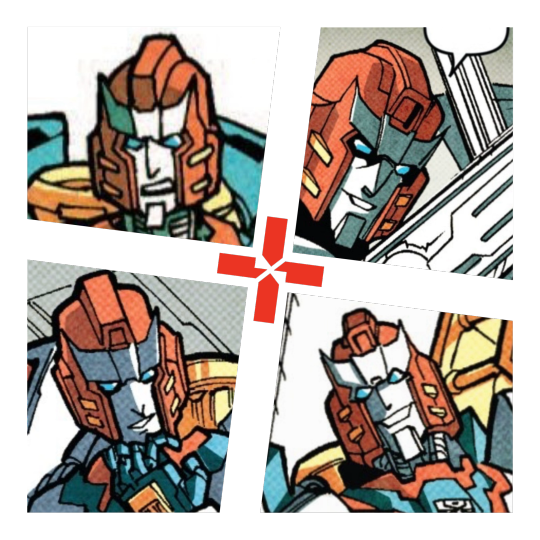
Medic, Maverick, Maniac, Murderer: Understanding Pharma
First thing’s first: I love Pharma, dearly.
In all the time I’ve spent evaluating his character, I’ve mainly focused on what can be worked out about who he is as an individual: his core sense of self, psychological drives, subjective worldview, etc.
When all else is stripped away, who is Pharma?
This treatise is the product of obsessing over Pharma, analyzing canon (and extras), and reading as many different perspectives on his character from fans across the fandom as I could find. The post is long, so for those of you who balk at the thought of reading a shortfic’s worth of Pharma thoughts, feel free to read the TL;DR (Conclusion) at the end and then decide if the full read is worth your time. Also, a premium reading experience is available in the form of the original Google Doc version.
As you read, keep in mind that this is primarily a mix of psychoanalysis, evidence-based examination, and speculation—not moral, ethical, or sociological commentary. The goal is to examine Pharma’s psychological drives and core values, and each of his appearances in the context of those. All other types of evaluation are up to readers.
Now, take your victim blaming-allergy meds (just in case); remove your black-and-white thinking caps; and leave your personal morality lenses at the door.
Psychological Drives & Core Values
Why does Pharma act the way he does? What gives him a reason to keep living? What are his personal priorities?
At the beginning of the Delphi arc, First Aid establishes Pharma as a “control freak” and someone who “thinks he’s an expert on everything.”

Now, First Aid has a habit of complaining about his bosses, but on both points, there’s canon evidence to back them both.
Expertise and Intellect
Throughout the Delphi and Luna 1 arcs, it’s established that Pharma is a skilled and brilliant doctor.
He once performed a 4-way fuel pump transplant, donating his own fuel pump in the process. (see above panel)
Later, he invented a soundbomb that left an echo laced with a virus and invented an antidote to that virus:
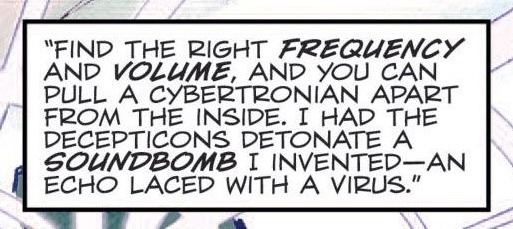
And on Luna 1, he was on the edge of finding a cure for Cybercrosis, based on the fact that Swerve was able to formulate a cure from his notes.
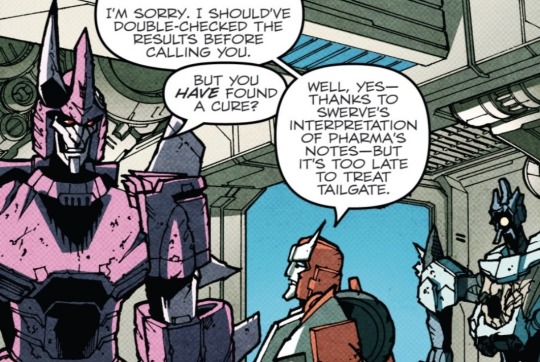
More than being a doctor, Pharma lives for intellectual and scientific achievement as a physician scientist. He feels most alive when he’s able to solve complex medical problems, and when his achievements are recognized by those whose opinion he considers important.
This is Pharma’s 'why.'
And even though he’s arrogant and enjoys praise, it’s not his primary motivation. He doesn’t need it in order to set his mind to whatever he’s interested in, although he’ll seek it from those he values most (i.e. Ratchet).
Pharma sees himself as less of a doctor, and more as a scientific innovator or medical maverick. The practice of medicine is primarily a catalyst for his creativity and intellect; it’s not an end in and of itself like it is for someone like Ratchet or First Aid.
First Aid’s observation of Pharma can be better phrased as, “[Pharma] thinks he’s an expert on everything medical”—because he’s not so driven by achievement and admiration that he’ll grovel at the feet of strangers and get good at something he doesn’t personally find interesting. The only time we see him express a desire for praise is when he’s around Ratchet—someone he holds in high regard for both personal and professional reasons. This makes sense since Ratchet is one of the only people who can give Pharma any kind of competition within what he considers to be his area of expertise.
“Each day we go to our work in the hope of discovering—in the hope that some one, no matter who, may find a solution of one of the pending great problems—and each succeeding day we return to our task with renewed ardor; and even if we are unsuccessful, our work has not been in vain, for in these strivings, in these efforts, we have found hours of untold pleasure, and we have directed our energies to the benefit of mankind.” —Nikola Tesla
Ego
Without question, Pharma has an inflated ego, but having an inflated sense of self doesn’t automatically mean a person is a full-blown narcissist or that they are totally uncaring.
Every personality trait exists on a spectrum. Yes, Pharma is arrogant, but the presence of arrogance doesn’t automatically and completely cancel out all “positive” traits. (For fun, check out studies on Dark Tetrad and Light Triad personality traits.)
People are complex. Arrogance can coexist with genuine kindness, ruthlessness can coexist with deep compassion, etc.
Whether Pharma exhibits genuine kindness is up to each reader’s interpretation of what little canon material exists, but the point is: Pharma’s arrogance doesn’t automatically rule out the possibility of authentic “positive” traits.
Controlling Tendencies
Pharma is comfortable pulling the power card and using it to dump what he sees as uninteresting parts of medical practice on those below him:
“So Fisitron’s writing about the Wreckers’ elbows now, is he?” said Delphi’s Chief Medical Officer. “Come on, First Aid - get to it. You’ve got a Fader in Row 2 downstairs.” He squeezed the air with his finger and thumb. “He’s about this far from shutdown.” —from Bullets by James Roberts
However, there’s nothing in canon indicating he’s power-hungry in a megalomaniacal sense. He’s not Starscream or Megatron; he doesn’t seek political or social power. In fact, he seems perfectly happy hiding away in a lab or medibay by himself so he can direct all his energy toward solving issues and achieving the so-called ‘impossible’ within the field of medicine:
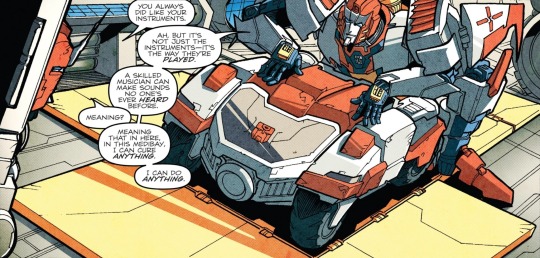
The ways in which Pharma exercises power and control are through his expertise, and his administrative/management skills. That’s it.
Self-confidence
Pharma’s arrogance and controlling tendencies don’t seem to be a mask—like he’s trying to compensate for some sense of lack (in those areas). Yes, he fears failure, and yes, he displays some insecurity when Ratchet questions his competence. But at every other point and in every other way, Pharma is unapologetically self-confident. He’s fully self-assured of his intellectual prowess and problem-solving capabilities; he knows what he knows, and he also knows what he doesn’t know.
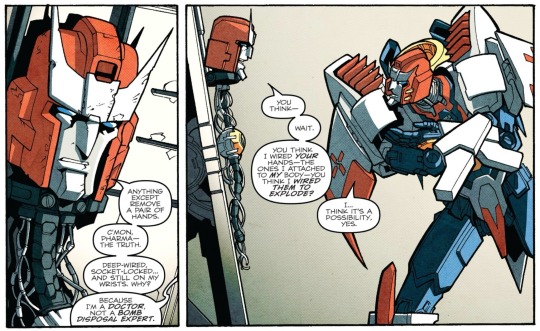
Pharma’s arrogance and desire for control don’t stem from a hidden lack of confidence or a hunger for power on its own. They stem from the fact that he genuinely sees himself as the best person for the work he does. He trusts himself above anyone else to solve problems that come his way—medical or otherwise (within limits).
Elitism vs. Superiority
I’ve always read Pharma as having an elitist attitude, but not in the social stratification sense:
elitist (adj.) relating to or supporting the view that a society or system should be led by an elite.
There’s no evidence that Pharma believes an elite class of people should hold the most power. Instead, Pharma’s “elitism” is actually an individualistic sense of superiority. It’s centered on him alone, and is tied to his capabilities as a physician scientist and surgeon.
Pharma sees himself as the best of the best and makes sure everyone knows it—sometimes through his words, but mostly by his conduct in the field of medicine. This, paired with Pharma’s natural temperament, doesn’t exactly make him socially popular—inside or outside of medicine:
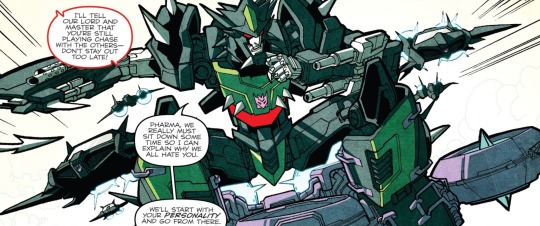
One could argue that the “personality” Lockdown is referring to was a result of all Pharma had suffered at Delphi and Luna 1, but just as easily, one could argue he was always a bit difficult to get along with, and that his traumatic experiences merely magnified his already-present psychological patterns. Personally, I like the latter interpretation because it’s a flaw that makes Pharma a more interesting character no matter his mental state.
Everyone reacts differently to real and perceived social rejection. Some are so concerned about it that they’ll try anything to belong; others genuinely don’t care, and they continue as usual; and still others cope by shifting their mindset and developing a sense of pride in being an outsider.
There’s no evidence for this in canon, but I believe it’s within reasonable characterization boundaries to headcanon Pharma as being in the second or third category.
With either of those two mindsets, a sense of superiority can develop, or even be an inciting factor. Either someone sees themselves as genuinely superior to the majority and doesn’t mind when this alienates them from people, or they convince themselves they’re superior because the pain of accepting they were rejected for who they are is too much to handle.
Whatever the case, the point is, having an “elitist” attitude isn’t necessarily rooted in a sociological or ideological belief. Sometimes, individuals just see something in themselves that—to them—justifies a sense of personal superiority. A quick glance at Pharma’s canon appearances makes it clear he holds such a view of himself, at least to some degree.
Morality and Compassion
When Pharma first shows up in canon, he’s working at the New Institute. A lot of questionable things took place there on a regular basis—things Pharma would have been aware of, to some degree. However, his presence at the Institute doesn’t automatically mean he agreed with everything happening. Depending on how strongly someone feels about something, some people are content to disagree in silence. Not everyone who seeks employment considers it a priority that the establishment they work for aligns perfectly with their moral values. After all, there are other reasons to take a job: financial benefits, exclusive educational and career opportunities, pure convenience, etc.
I’m not here to say either way whether Pharma’s willingness to turn a blind eye to the events at the New Institute was wrong or right; that’s up to each reader to decide for themselves. However, Pharma’s choice to remain employed at the Institute for some time can say something about him as a character: his priority as a doctor and person is not to take care of everyone he encounters, or to act as some kind of moral or ethical authority.
This isn’t to say Pharma won’t ever stand up for something he regards as right or push back against something he sees as wrong, “off screen.” It’s just that everything in canon points more to a tendency to choose his battles instead of acting immediately on any moral sense the way someone like Optimus or Ratchet might.
This also isn’t to say Pharma doesn’t care about saving lives, but from what little is shown of him before Delphi, it’s hard to say how much he cared. Ratchet confirms later that Pharma was an excellent doctor for most of his life, but all that tells us is he was an excellent doctor; it says nothing about his internal attitude toward his work or patients.
However, inferences can be made based on doctors in our own world:
Being a doctor—especially one in trauma care—is far from easy. It takes a lot out of a person, and there are very few people who last in the profession for a long time. Most medical professionals fall into one of the following categories:
People possessing a strong will that’s coupled with an unwavering passion for taking care of others (the public’s favorite)
People who naturally have, or develop, an ability to switch their empathy off and on at will, or build walls around it—also possessing a strong will (the ideal)
People who naturally have a limited capacity for empathy (the one the public hates to acknowledge)
People with a strong social and professional support system (the necessary, but underutilized and underappreciated factor)
Of course, even if a person has one or more of the above, burnout can and does still happen, but individuals who have at least one have the best chances of surviving and thriving amidst the demands of the majority of medical professions.
As far as is shown in canon, Pharma never had a strong support system—either circumstantially or by choice—so something else was keeping him in medicine.
Pharma shows concern for both Tumbler (Chromedome) and Hubcap:
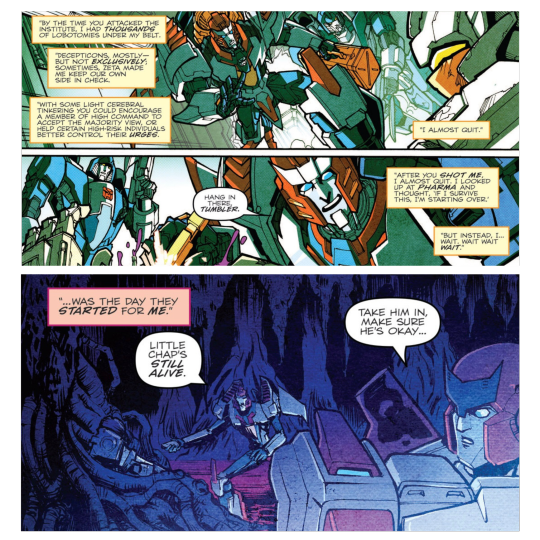
But even though he obviously cared enough to step in, neither instance makes a strong case for a capacity for empathy beyond the “average” or “norm.” Performing a job well is a lot different from being personally invested in the work.
Based on everything up to this point, and this later comment from Pharma, about Ratchet…
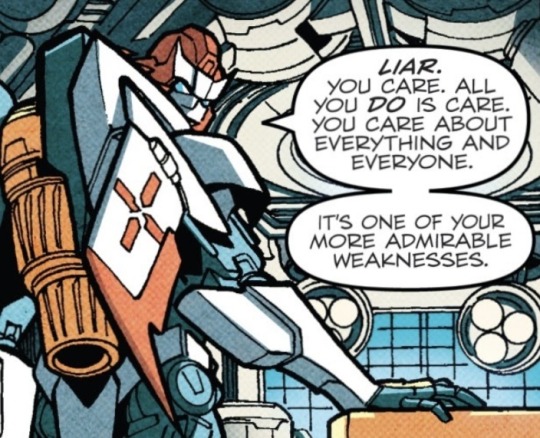
…Pharma has probably never shared the same I-care-about-everything-and-everyone view of the world. Instead, it’s more likely that Pharma holds a more rational view of his work and patients.
One of the first things learned in medicine, especially in trauma medicine, is that you can’t help or save everyone, and to hold yourself to that standard can destroy you quickly if you have a certain temperament or lack healthy boundaries for your empathy.
“There are times when it may seem as though I view sick or injured people not as living, breathing humans with feelings and emotions and people who love them, but simply as cases, as problems to be solved. And that is absolutely true. It's not that I don't have empathy, but the hard fact is that as a doctor, and especially as a trauma surgeon, too much empathy can get in the way of your job and cause you to make decisions based not on sound medical judgment but on your own emotions. Sure, I've seen things that even years later can still make me choke up when I think of them: a little girl shot and killed, a shattered young Marine who shouldn't have died but did. But you can't choke up in the ER or the operating room. To be effective as a trauma surgeon, you have to put a layer of Kevlar around your heart.” —Dr. Peter Rhee, Trauma Red: The Making of a Surgeon in War and in America’s Cities*
Pharma may have learned this difficult truth earlier than Ratchet and developed a practical way of managing his empathy that comes across as “cold.” He may have always had an ability to put up walls around his spark. Or, he may have always had little to no capacity for empathy.
The fact that the morality lock on Tyrest’s portal prevented Pharma from passing through proves he felt guilty for what he’d done, and JRO confirmed this. Therefore, it’s safe to assume Pharma had some level of empathy for his former patients, suffering moral injury when he felt he had no other option but to start killing them.
Still, looking at Pharma’s psychological drives and his behavior throughout canon, it’s clear compassionate care and morality are subordinate to his other values and interests.
*I highly recommend this book, and learning about Dr. Rhee in general. He’s a huge inspiration of mine, and one of my main sources of inspiration when writing Pharma. Level-headed and capable, strong-willed, selectively empathetic, an excellent scientist, etc. He lives for the thrill of practicing medicine both on the floor and as an expert in his field who pushes trauma medicine to new heights through his research. He also takes great pride in his hands. Seriously—the man spent an entire paragraph and a half talking about his “good hands” and how they were one of two reasons he decided to go into trauma surgery. The other reason was that he “liked action and excitement, liked the feeling of being able to walk into a tough situation and take control.” (Sounds familiar…)
Delphi
First thing’s first: we don’t know how much Pharma did or didn’t know about the DJD before agreeing to take the Delphi assignment.
That far into the war, he would have known something about the DJD and their ways of terrorizing traitors and Autobots, but for whatever reason, he took the assignment anyway. Perhaps Prowl assured him the situation on Messatine would be monitored and that the security team would be enough. Perhaps he underestimated the DJD’s capabilities, or scale of territory, and thought he would be able to handle things on his own. Perhaps Prowl gave him no choice. Maybe it was all of these and more.
Whatever the case, according to JRO, Pharma didn’t hate Delphi before the incident with the DJD.
Word of god remains a touchy subject in fandom, but in this case, it’s important because it says two things:
The DJD left the Delphi medical team alone for some time.
Being on the edges of DJD territory didn’t automatically mean isolation and harassment by their hand.
On the second point, First Aid was free to come and go from Messatine as he pleased, seeing as he attended a medical conference at Kimia five years into his assignment at Delphi:
Five years ago [mid-Delphi assignment], the leader of the Wreckers had cornered him at a medical conference at Kimia, the space station that doubled as a weapons research facility. —from Bullets
And five years after that, he was able to not only contact Springer without delay about one of Agent 113’s bullets he’d discovered in an Autobot badge…
He raced upstairs to his computer terminal and typed in a certain frequency code for the second time in his life. A face appeared on the screen and grinned. “It’s me,” said First Aid. “And you're never gonna guess what I’ve got for you..!”
…but he was also able to meet up with Springer to hand off the bullet:
“Your friend has a funny way of making contact,” First Aid had said when he’d got in touch three days earlier, and he was right.
It’s not known if this handoff happened on or off world, but either way, the DJD didn’t interfere.
At some point, Tarn set his sights on Pharma and the Delphi team. Knowing the DJD, one can only imagine what Tarn used to show off his team’s capabilities and convince Pharma the best option was to cooperate.
In striking a deal with Tarn to keep the DJD away from Delphi, Pharma established his territory and ensured his continued security and the safety of his staff. As long as Tarn got his T-cogs, Pharma could continue on in relative peace. He could work his magic on bots that ended up at Delphi, carry out his management duties, and work on whatever projects or research he may have been conducting in his free time.
For whatever reason, after he first came into contact with Tarn, Pharma didn’t call for help. Communications were still operational, as Pharma wouldn’t have suggested contacting High Command about the Duobots if the team was aware of any comm malfunctions:
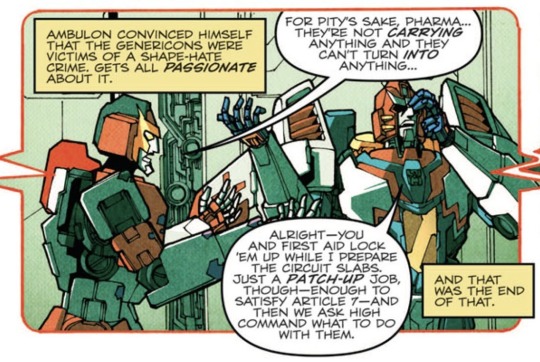
Also, First Aid later confirms that communications were fine until the Big Bang (soundbomb detonation):
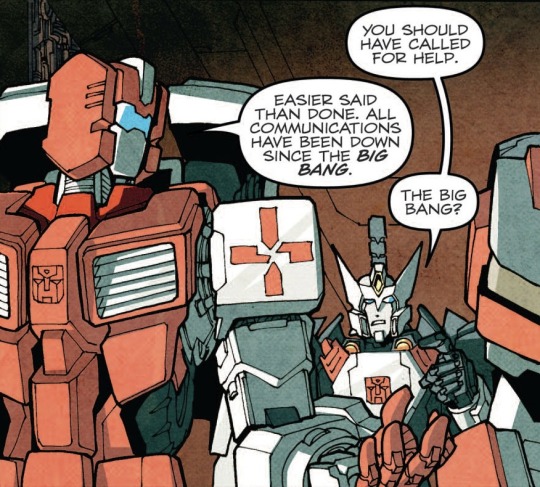
It’s always possible the DJD was monitoring the radio waves, but secure subspace frequencies exist, such as the Datalog Network First Aid used to send the datalog containing the death statistics:

Speaking of which, assuming First Aid sent the datalog with the statistics right when things started to get ‘weird,’ and before the Big Bang shut down comms, it only took—at most—a few days for them to reach Ratchet and Swerve on the Lost Light:

But back to Pharma not calling for help: for all of Prowl’s intel, contingency planning, and fretting over the security of Autobot territories, I find it hard to believe he would have stuck an Autobot medical team on the fringes of DJD territory without giving them some means of securely contacting the outside in case of issues.
But even if Prowl didn’t give Pharma a secure way to contact him or anyone else, and even if Pharma was convinced the DJD was monitoring regular communications, there were other ways he could have reached out for help. After all, the team wasn’t alone on Messatine. Like Pharma said, Prowl continued to send bots to defend the nucleon mines:
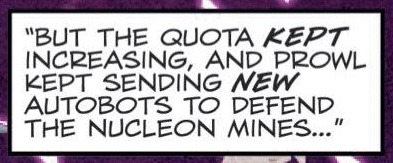
The Autobots had been mining nucleon for millions of years at this point, so I doubt the mined nucleon was just sitting in storage on Messatine; shipments of the stuff would have been sent off-world to wherever the Autobots needed it. Why not send a message for Prowl with someone leaving with one of those shipments? A message meant only to be sent over a call when absolutely certain they were out of range of the DJD’s potential monitoring.
Or, why not order in off-world medical supplies and send a message back with the delivery bot(s)?
There are two possible answers to this. One takes into account JRO’s word on the subject; the other is more intricate and speculative on my part, but it leads to the same place. So whatever your stance is on the validity of word of god, there’s an answer for you.
Answer one (word of god)
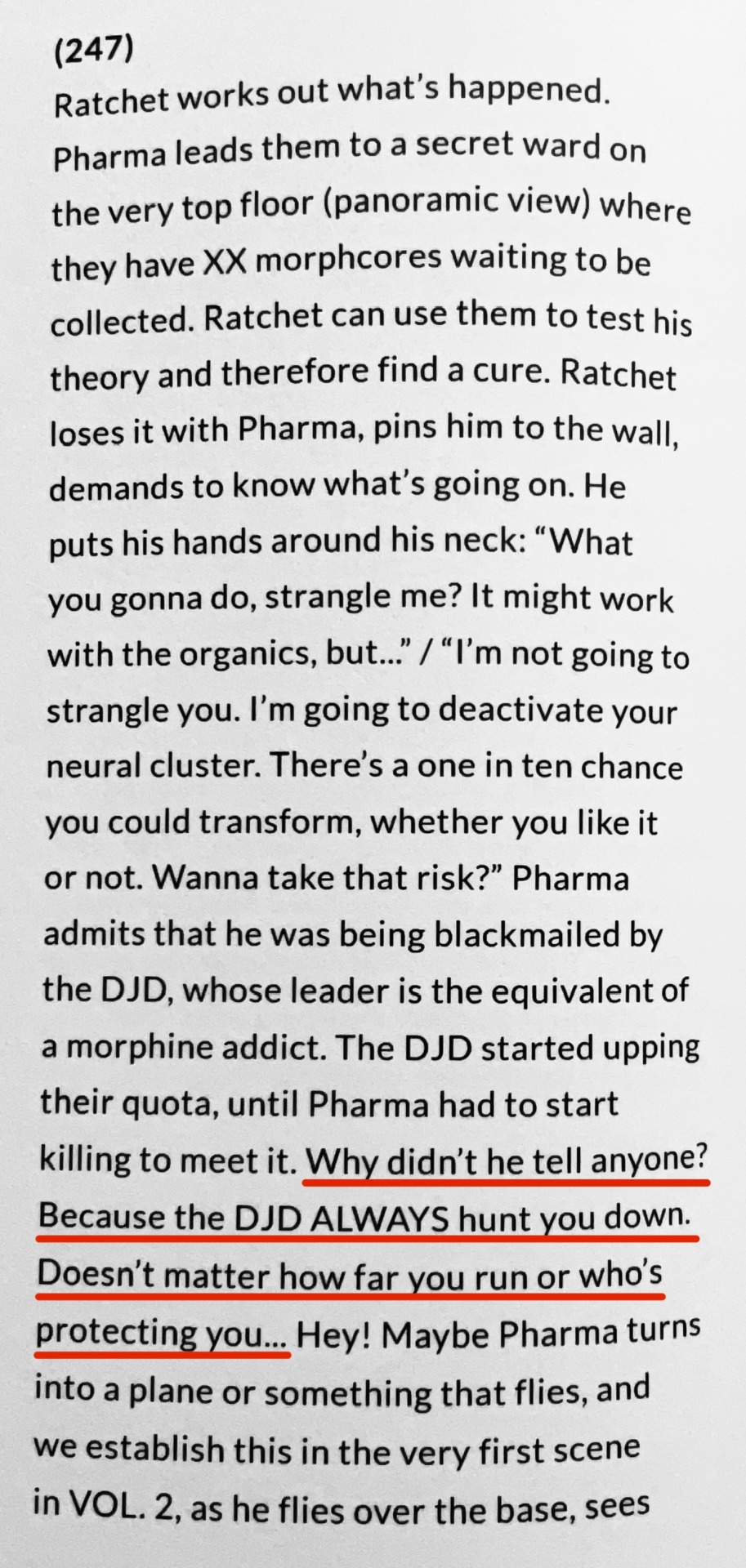
Simple as that. Pharma was aware of the scope of the DJD’s capabilities and relentlessness, and determined he was trapped prey.
Answer two (no word of god)
There are a few possible reasons Pharma didn’t call for help right away:
He was convinced all his other options would take too long and/or would still lead to him being put under suspicion. After all, being found to have harvested even a single T-cog from an already-dead patient for the DJD could have raised concerns that would lead to Pharma being investigated and/or having a mark put on his record.
He underestimated the severity of Tarn’s addiction, and was certain he could keep up with the T-cog demand without resorting to other means of harvesting, not realizing Tarn’s quota would increase later on.
He was already paranoid as a result of whatever mind games Tarn had set in motion at their first meeting, making Pharma think escape was futile.
Word of god or no word of god, there are clear reasons as to why Pharma ended up trapped. Most likely, it was a mix of all of the above.
Whatever was going on in Pharma’s mind before, he ended up in deeper trouble. Tarn increased his demand for T-cogs, and Pharma couldn’t keep up. By the time this happened, even if he had wanted to call for help, it was too late to do so without implicating himself. He reasoned his only option was to start killing patients to harvest their T-cogs.
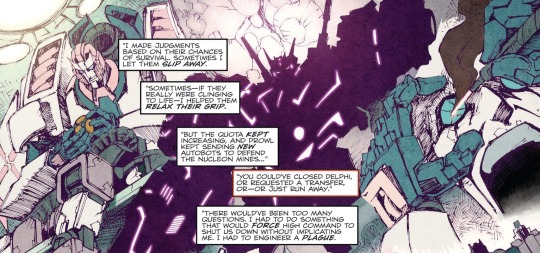
Soon, Pharma was so consumed with fretting over whether he’d be able to meet Tarn’s next demand that he didn’t have time or freedom to do anything else except worry and feel guilty. His whole life revolved around Tarn’s addiction; he was no longer in control, and could no longer enjoy whatever it was about Delphi he’d previously enjoyed. Perhaps the facility itself enabled Pharma to research cures and perform scientific miracles of medicine.
Being at the mercy of Tarn—convinced the DJD would find him no matter what—would have been pure psychological torture on its own, but also knowing that any small chance he did have of getting help would end in him losing everything would have added to his suffering. Pharma became desperate to reclaim control over his life and began planning an escape.
Now, JRO has said that Pharma didn’t originally plan to use the rust plague on the DJD…but canon says otherwise:

Of course, Pharma could have been lying to make himself look better in Ratchet’s view, but based on everything he’d been through up to this point with Tarn, it’s more likely he was telling the truth and had tried to eliminate the source of his suffering first. After all, wiping out the DJD would have been the simpler, cleaner option.
When the Duobots refused to detonate the soundbomb near the DJD, Pharma’s objectives shifted. He had to get Delphi shut down in a way that would:
Convince the DJD the shutdown was legitimate.
Pharma knew chances of escaping the DJD at all were slim to none, but he was desperate. Getting Delphi shut down would cut off Tarn’s supply of T-cogs and allow Pharma to escape Tarn’s immediate control, but the shutdown had to be “legitimate” to prevent Tarn from retaliating and hunting him down later. Leaving Tarn even the slightest chance of regaining control was too risky, so Pharma had to make sure his plan was as airtight as possible.
Cover up the patient murders.
If the truth got out about Pharma killing patients, he’d lose his medical license and most likely be put away for life. Being cut off from the practice of medicine and his intellectually stimulating work as a doctor would mean losing more than a job and a reputation. It would mean losing everything in which he’d anchored his sense of identity and life’s meaning. His refusal to consider any other options wasn’t just about ego and preserving his image as an excellent doctor; it was about preserving any kind of meaningful future he saw for himself.
Pharma needed a plan that would fulfill all of the above. Turning the engineered virus on the medical facility was the most effective and efficient solution. Anything else would have made him suspicious in the view of either Autobot High Command or the DJD, and neither of those would have ended well for him.
Because of his goal to preserve his reputation and future in medicine, he couldn’t even risk revealing anything to First Aid or Ambulon, who would have seen to his ruin. They became nothing more than loose ends that had to be tied up, and based on the fact that Pharma only prepared one vial of the vaccine, his original plan involved him being the only survivor:
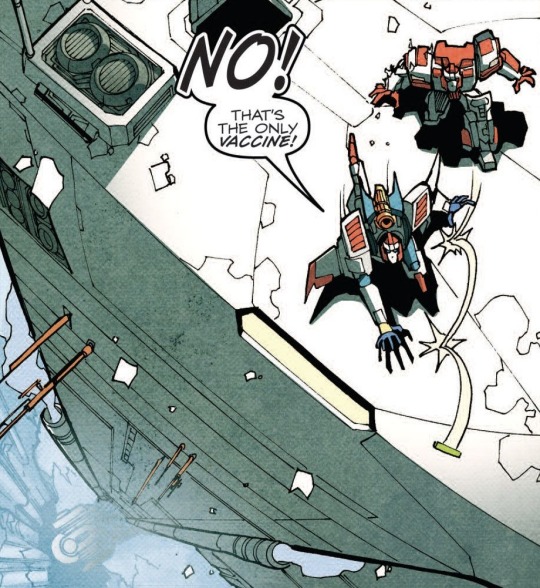
He probably would have had no problem making more of the vaccine for anyone else who survived, but he wasn’t counting on it. He wanted a totally clean slate; in letting his staff die with most of his patients, he would be getting rid of any and all evidence and reminders of his failures. He may have cared about First Aid and Ambulon before things got bad, but somewhere along the way, he decided either it wasn’t worth it to go through the trouble of finding a way to save them without raising suspicion, or he didn’t want to risk them putting together the pieces later on.
Of course, when Ratchet showed up, plans changed.
Ratchet
Ratchet is not the kind of person who seeks first to understand or be understanding. He’s inclined to trust what’s in front of him over anything abstract, and tends to look at the results of someone’s actions over trying to find any kind of ‘why’ behind them. Also, unlike Pharma, he operates from a strong moral sense, and reacts quickly and strongly when something or someone goes against that internal moral sense.
Ratchet’s reaction to finding out what Pharma did may seem hasty and harsh, but it makes perfect sense on a human level. There is no such thing as unconditional love; everyone has personal and moral lines (boundaries), and they’re different for each individual. When the most rigid of lines is crossed, that’s it; walls go up and the offender is cut off, no matter how strong the relationship may have been.
Ratchet obviously knew Pharma well enough to think he could try talking some sense into him, but then Pharma revealed that he’d crossed one of Ratchet’s lines: murdering patients. Any willingness Ratchet may have had to try to understand vanished. By the time Pharma started trying to provide a ‘why’ for his actions, Ratchet’s moral judgment had already shut down any chance of understanding what could have possibly led Pharma to kill patients. It didn’t help that Pharma seemed totally unapologetic and outright proud of his plan. For Ratchet, the ‘why’ didn’t matter anymore. What he saw was what he trusted, and what he saw was a friend who’d become his idea of a monster.
Now, Ratchet and Pharma’s relationship is one of the most confusing IDW relationships I’ve had the pleasure and pain of dissecting.
It is notoriously difficult to determine the depth and strength of a relationship from the outside. However, I’ve decided to go ahead and address it anyway because it has the potential to provide insight into Pharma as an individual.
If I were to sum up Pharma and Ratchet’s relationship in a single word, I would use “ambivalent.” The first time I read MTMTE, the thing that stood out to me most about their relationship was the drastic differences between how they each perceived the relationship.
In one sense, there’s the idea of Pharma basically being Ratchet’s crazy stalker ex, which is tossed around in fandom a lot. While I personally dislike seeing it regardless of context (yes, even as a joke), I do see how JRO’s writing choices set things up in a way that makes it easy to superimpose that trope.
In another sense, there’s the idea that Pharma and Ratchet were always close friends, and that what happened at the end of the Delphi story was a betrayal of both sides that came out of nowhere and whose consequences were taken too far.
I disagree with both. Personally, what I see at the end of the Delphi story isn’t an obsessed ex gone mad, a sudden betrayal, or a badly executed backstabbing. What I see is a breakdown of an already-complicated and poorly-maintained relationship: true feelings being revealed, long-repressed bitterness being forced to the surface, carefully-hidden cracks being split wide open.
Most people don’t have an accurate understanding of how much or how little they truly know the people in their lives, often overestimating how well they know a person until something surfaces and blindsides them.
According to JRO, Ratchet was oblivious to Pharma’s romantic interest, and throughout canon, it’s easy to see Pharma was more invested in the relationship than Ratchet ever was.
The question is, did Ratchet ever care about Pharma at all? And if so, to what degree?
Yes, Ratchet calls Pharma “buddy” and “friend,” but the former was sarcastic, and the latter means something different to each person. Also, in light of the circumstances, Ratchet could have just been saying “friend” in response to Pharma saying it—an emotional appeal more than anything.
However, Pharma must have been aware of Ratchet’s lack of relational investment because during the confrontation at Delphi, Pharma’s first reaction wasn’t to appeal to their friendship (ex: “But you know me!”). Instead, he appealed to their shared profession:
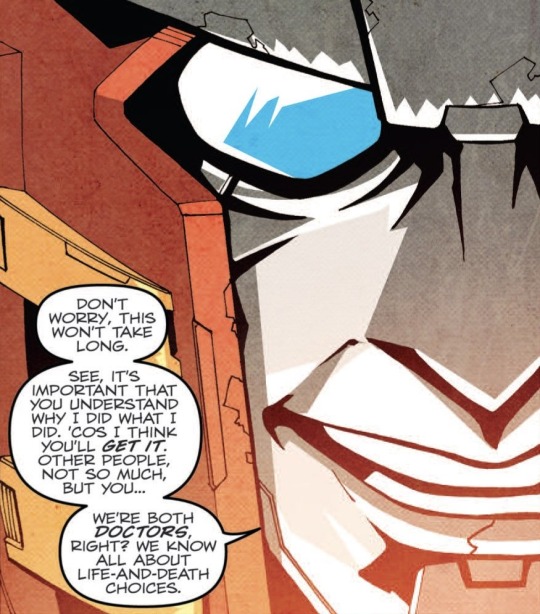
Then there’s the exchange of insults:
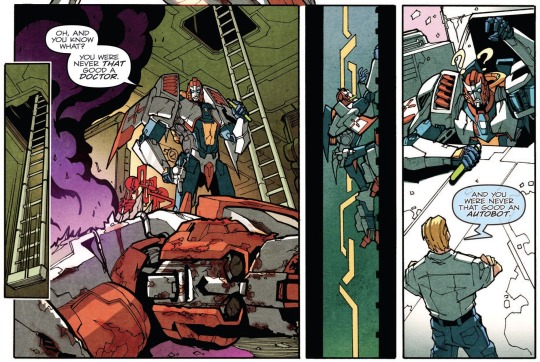
This is what I meant earlier by “true feelings being revealed.” Ratchet may have just been trying to match Pharma’s insult, but it’s unlikely it was merely reciprocal because while Ratchet is snarky at times, he’s sincere in that snark. There’s almost always some truth in his verbal jabs no matter how unserious they seem, and he’s never cruel for cruelty’s sake.
So, if Pharma saw Ratchet as an inferior doctor, and Ratchet saw Pharma as an inferior Autobot…it’s reasonable to assume there was always some deep-rooted competition and conflict preventing them from being super close.
Possible suspicion surrounding Pharma’s conduct as an Autobot paired with a tendency to misjudge the nuances of relationships could explain why Ratchet was so quick to decide Pharma was a lost cause. Maybe Pharma’s actions at Delphi confirmed something from the past that Ratchet had brushed off for whatever reason.
In any case, Ratchet seems to have been largely unaffected by the Pharma he found at Delphi. While leaving Messatine, he emphasizes that he’ll miss Pharma’s talent.

Not “who he used to be.”
Not “what we used to have.”
Just…“his talent.”
Later, on Luna 1, Pharma mentions that he and Ratchet were inseparable, but that could mean a few different things:
Best case scenario: Pharma and Ratchet sought each other out on equal terms.
Worst case scenario: Pharma followed Ratchet around.
Somewhere in the middle: the job forced Pharma and Ratchet to work in close proximity most of the time, and while Pharma intentionally ran into Ratchet more often than necessary, Ratchet also sought out Pharma every now and then.
Whatever the case, working with someone every day doesn’t tell you anything about who they are as a person, and the amount of time spent with someone doesn’t automatically correlate to how deep the relationship is or how well the people know each other. It’s not like either Pharma or Ratchet are shown to be good at expressing their personal feelings outside of extreme circumstances.
Ratchet does bring up late-night conversations of the past:

But while this indicates there was something deeper between him and Pharma, because neither of them were ever shown to be super open with their true feelings, it’s unlikely the conversations were full of touchy-feely talk. In all likelihood, the conversations were mostly medicine and war-related, with the rare spark-to-spark talk sprinkled in. Also, considering everything up to this point, one has to wonder if those talks ever meant anything to Ratchet, or if he was just digging for something that might stall Pharma’s torture.
Maybe those late-night conversations did mean something to Ratchet, but whatever the case, Pharma didn’t take the bait. He knew Ratchet was trying to stall by making an emotional appeal, and perhaps he was convinced the conversations hadn’t meant that much to Ratchet.
Looking at all of this, it’s hard to believe Ratchet ever cared about Pharma as more than an interesting work friend. But even if he had cared more than he let on, it wasn’t enough to overcome the doubts he had about Pharma’s character.
As for whether Pharma truly cared about Ratchet, I’m convinced he did, but in a mostly unhealthy way, and with a strong undercurrent of one-sided rivalry. At some point, Ratchet had been an equal and a source of challenge, and he probably listened to Pharma pretty often. It’s reasonable to assume Ratchet was one of the only people—if not the only person—able to handle Pharma’s intense temperament and challenge him in a meaningful way, providing some semblance of friendship for Pharma.
However, one last thing that stands out is that, when telling Ratchet why he’s torturing him, Pharma didn’t say anything like, “Because you hurt me” or “Because you turned against me—your friend.” Instead, he said it was for “ruining things at Delphi” and because “you declared war on my body.”
Either Pharma wasn’t being entirely honest, or Ratchet’s friendship didn’t mean as much in the first place as he’d previously implied. It’s possible the ‘Because you hurt me’ was implied in “for ruining things back at Delphi,” but why not say it outright? Perhaps it was a fear of vulnerability and admitting there was ever a relational need at all.
At the end of the day, it’s difficult to say for certain how close Pharma and Ratchet were, but it’s clear they were never on the same page and there were always barriers between them.
Luna 1
Revisiting the matter of Pharma’s morality taking a backseat to other priorities, his time on Luna 1 further underscores this. Again, Pharma chooses his battles and is unwilling to put himself at great risk for the sake of others, but a closer look at the situation with Tyrest reveals there wasn’t really anything he could have done for the Cold Construct population even if he had wanted to. It would have been him against Tyrest, an army of Legislators, and a bunch of Decepticons. Pharma knew his limits, and seeing as his goal was self-preservation, it was perfectly rational for him to go along with Tyrest’s grand scheme.
Besides, it doesn’t look like he was given much of a choice:

Although, knowing Pharma, he still would have demanded to know beforehand what he would get in return for the pain, and evidently, Tyrest held up his end of the deal since Pharma had access to the Luna 1 tech collection.
As for Tyrest’s plan to wipe out the Cold Construct population, there’s nothing indicating Pharma’s decision to turn a blind eye to it was rooted in malevolence or bigotry—just rational apathy: ‘I can’t stop Tyrest, so why concern myself with the outcome?’
Again, you can’t save everyone; Pharma had all he could do to save himself.
But it wasn’t all horrible. I would even go so far as to say Pharma found some happiness on Luna 1. Tyrest didn’t care about him, but he didn’t need Tyrest to care. Everyone else there hated him, but he didn’t need to feel like he belonged or was admired. At this point, Pharma’s only interest was Tyrest’s Luna 1 tech collection, and that meant playing nice so he could keep his reward. Back at Delphi, he probably assumed he’d never again practice medicine the way he’d loved; being brought to Luna 1 was an unexpected, yet welcome, second chance.
Even so, Pharma had his moments of cruelty. Back at Delphi, he had easily-identifiable reasons to kill patients—both the ones whose T-cogs he harvested and the 20 more he tried to kill when he shot the life support machine. But on Luna 1, he had no reason to be cruel, yet he chose to be. By this point, he’d mastered the ability to almost completely ignore or subdue his conscience.
In the case of Ratchet’s torment, one could argue Pharma only drew it out for retaliation purposes; it was personal for him.

As for cutting Ambulon in half, it was obviously meant to be as gruesome as possible, yet also quick. But personally, I don’t think it was about Ambulon; it was more about hurting Ratchet. Due to the fact that Ratchet’s identity is wrapped up in his compassion and his ability to be helpful as a doctor, one of the most effective acts of revenge would be to do something that makes him feel utterly helpless.
Also I wonder if, subconsciously or consciously, Pharma was attempting to recreate the sense of helplessness he felt back at Delphi under Tarn’s watch: “Do you see, Ratchet? Do you now understand how it feels to have control ripped out of your hands? To be totally helpless?”
Next, for some reason, Pharma was invested in the promised execution of Getaway and Skids:

He had no personal connection to either of them that would give him a reason to be interested, so maybe Tyrest told him he could perform the execution and/or have the corpses for medical experimentation. Either way, Pharma would have had a chance to use some of the tech in Tyrest’s tech collection, possibly explaining his excitement.
Of course, any chance of an execution disappeared when the final showdown went wrong.
When Pharma tried to escape to Cyberutopia and discovered he couldn’t pass through the spacebridge forcefield, he gave up. He’d been caught; he would no longer have access to Tyrest’s tech collection; Ratchet and every other self-righteous Autobot would never forgive him; and the morality lock prevented him from escaping. By all appearances, he would never again be able to engage in that which gave him a sense of meaning. He had shrunken his world down to his obsessive interest in a specialized field and one significant, yet unrequited relationship. With both of these lost, his world collapsed.
Yes, guilt played a part in Pharma’s despondency, but because he seems to have been in denial of said guilt, it’s more likely his despair was primarily due to the fact that he saw no future for himself. He had nothing left to live for.
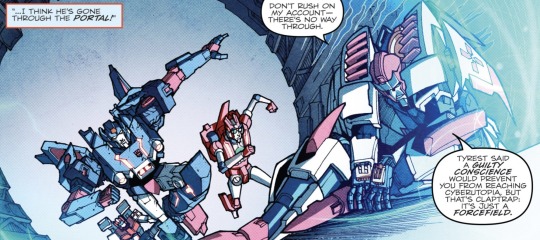
In light of this, Pharma’s flippant comments to First Aid make sense. He wasn’t being insensitive as much as he was goading First Aid. Pharma’s not stupid. First Aid had a massive rotary cannon on him, and Pharma knew exactly which emotional buttons to push to get him to pull the trigger.
Pharma wanted to die.
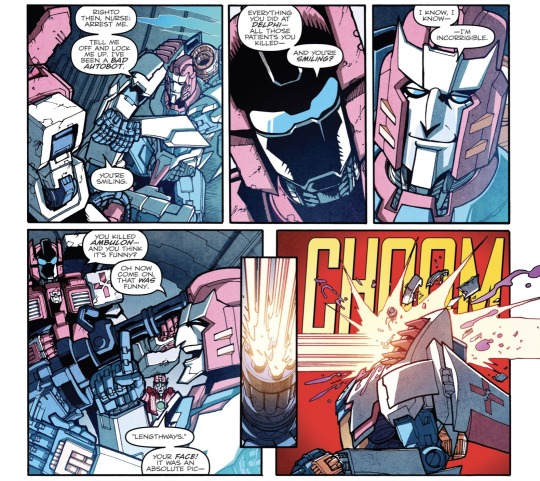
Adaptus
First, let me emphasize that Adaptus did not take possession of Pharma’s body. Instead, Pharma was the unwelcome guest:
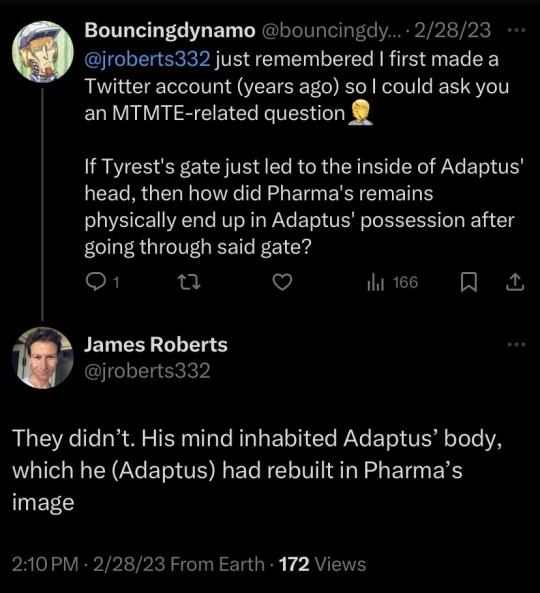
How Pharma ended up in Adaptus’ new body is a mystery, but whatever the case, Pharma didn’t pass on to the Allspark. Whether or not he had a choice can only be speculated.
First Aid had blasted Pharma’s head clean off, so whatever happened must have been related to the spark. Perhaps some residual spark energy was trapped in a body part that Adaptus repurposed, leaving Pharma tethered to the new body unwillingly.
Still, Pharma managed to assert his will and override Adaptus for a brief moment. Considering Adaptus was basically a god, this is impressive.
Based on Adaptus’ surprise at being interrupted, it seems he didn’t know Pharma was there. Why Pharma hadn’t tried to assert himself sooner is a mystery. Maybe Adaptus’ scheme was entertaining; maybe Pharma actually liked the company; or maybe he’d been waiting for an opportunity to get revenge on Tyrest for everything done to him back at Luna 1.
Sure enough, just like with Ratchet back on Luna 1, Pharma’s vengeful streak came out as soon as there was an opportunity.
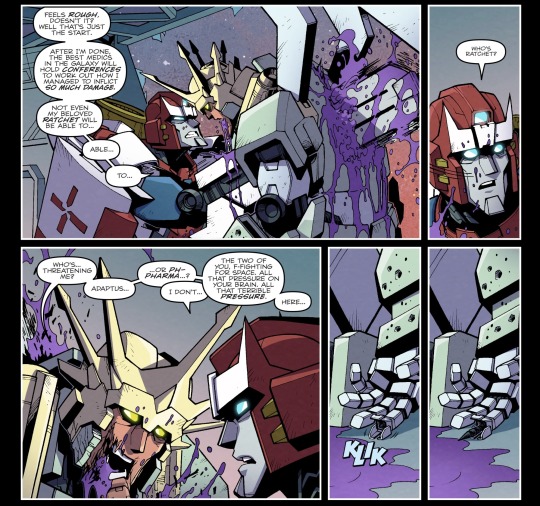
Unfortunately for him, this left him vulnerable, and Tyrest took advantage of the confusion:
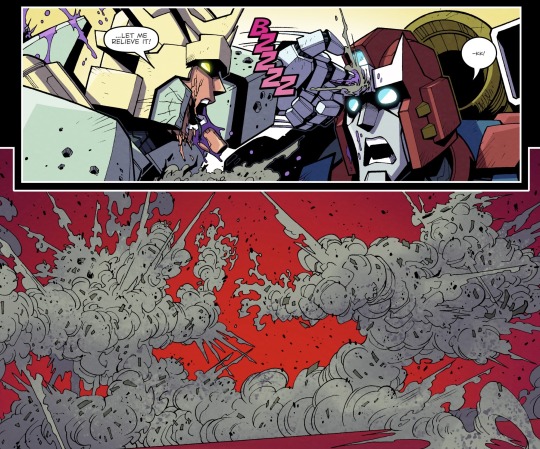
Conclusion
When someone reduces their world to narrow personal interests and one or a few very special people, their grip tightens around what little they have. They often become obsessive and possessive of the few things that make them feel alive, and their view of the world becomes increasingly more subjective and detached from the outside world. Pharma seems to have fallen into this trap.
Even so, in the context of the circumstances, several of the decisions he made were rational—even if coldly so. Oftentimes, “extreme” rationality and self-preservation are villainized in fiction, and characters like Pharma who don’t automatically put themselves at great risk for anyone and everyone are villainized, or at least looked down on. Their choices are often regarded as less human, but rationality and self-preservation are just as human as compassion and self-sacrifice.
Ultimately, Pharma was trapped and pushed over the edge into “insanity” by Tarn’s cruelty, but his own choices made from a place of pride determined how he fell, and how far he fell. It was a perfect storm of Tarn’s mind games and Pharma’s intellectual arrogance, excessive self-confidence, obsessive nature, and stubborn grip on the kind of future he wanted for himself.
Pharma is yet another Icarus who flew too close to the sun and paid dearly for it, and while JRO/the narrative could have given this Icarus better wings, that doesn’t change the fact that he chose to fly so high.
***
Many thanks to anyone who made it to the end of this monster of a post.
-tosses a Rodimus Star at you-
#look who finally finished this thing#idw transformers#idw1#maccadam#MTMTE#lost light#idw pharma#pharma#tf idw character analysis#tf idw meta#dr. fancy hands#nova’s nerding out again
589 notes
·
View notes
Text
odd thought of the day about elven physiology is that it's probably necessary for mer to grow more than two sets of teeth over the course of a 200- to 300-year lifespan. either this is a natural perk of merish longevity and vigor or the telvanni cured edentulism back in the first era + excitedly used this innovation in medicine to devise new and horrible spells
307 notes
·
View notes